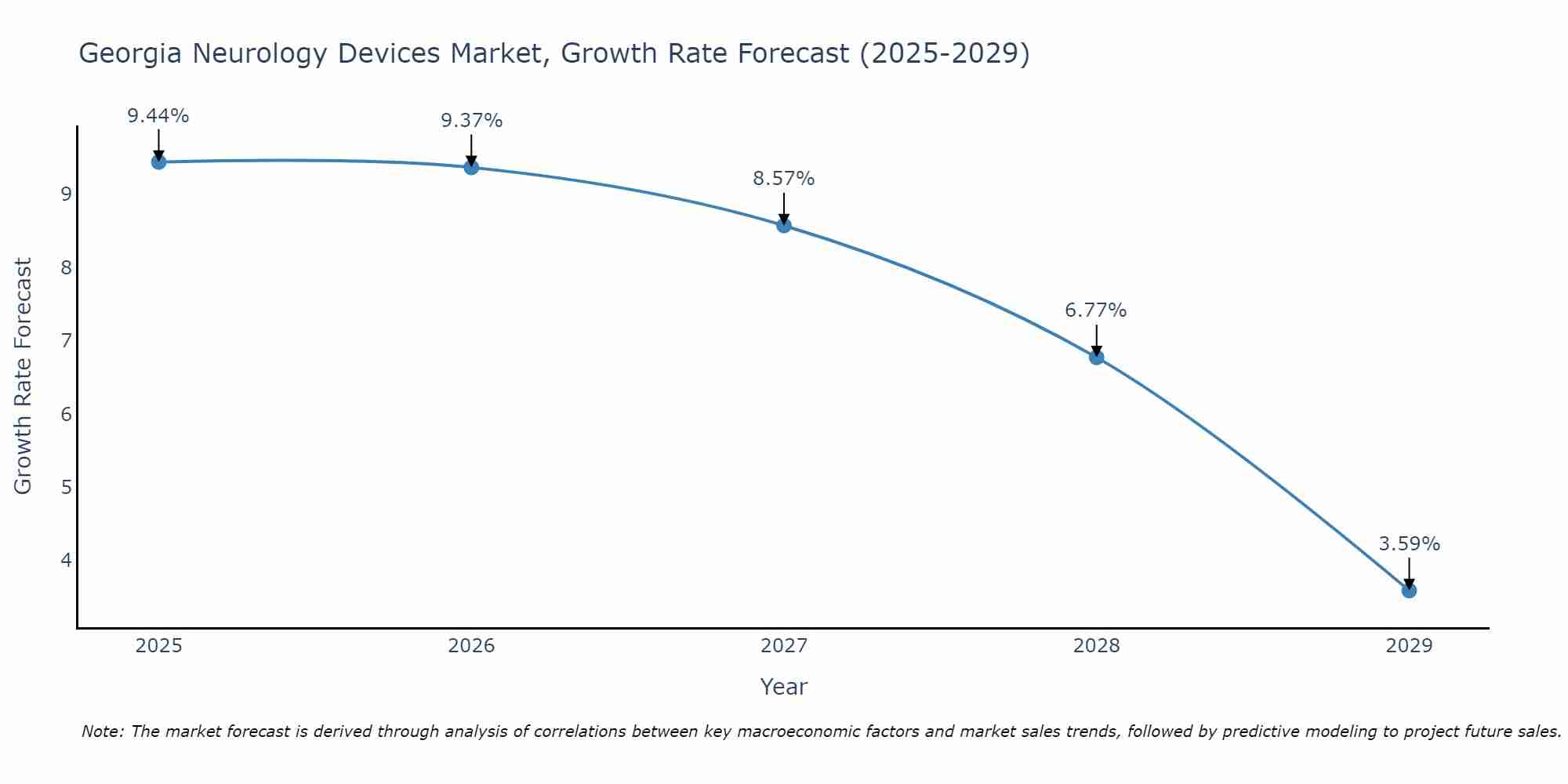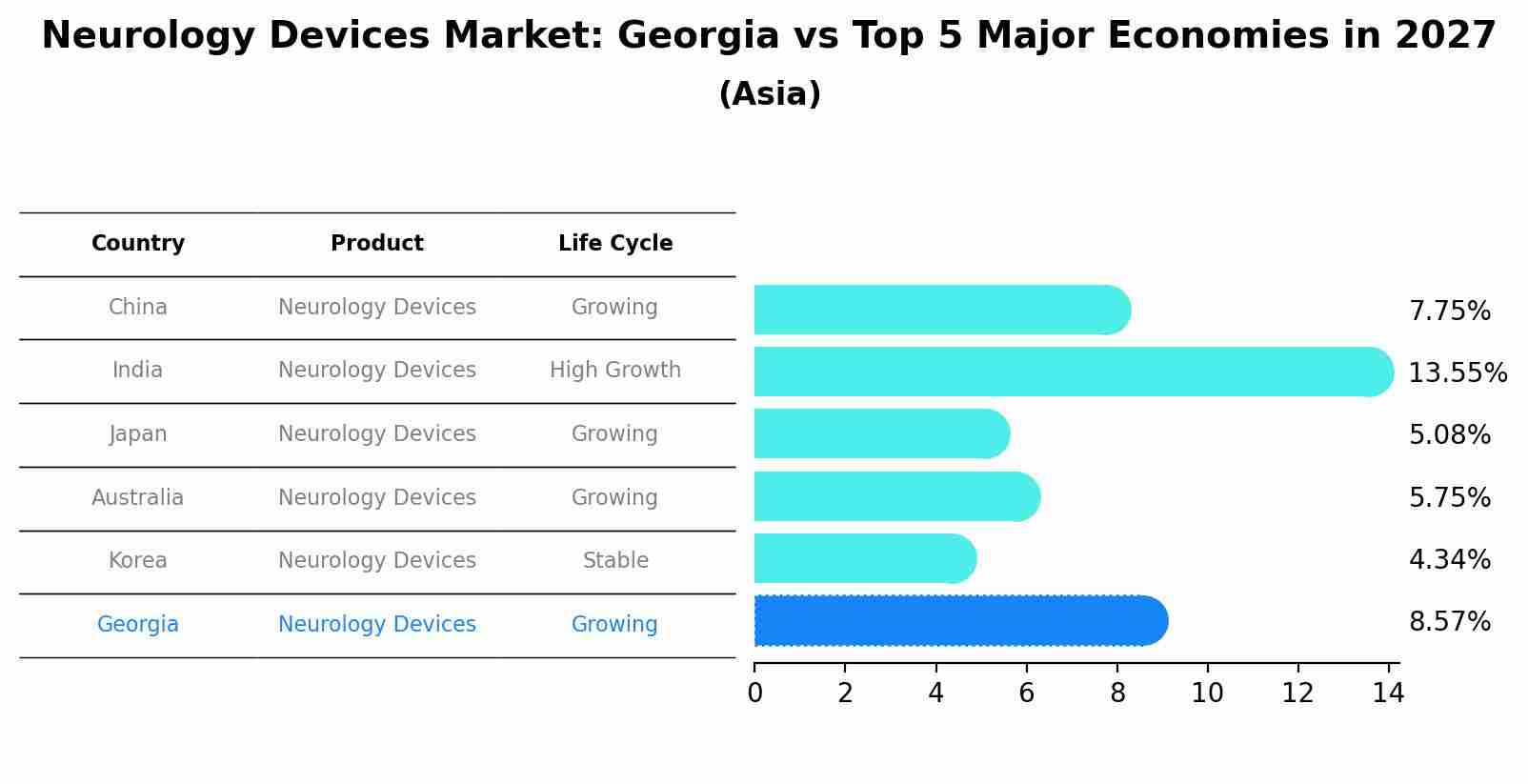Georgia Neurology Devices Market Outlook | COVID-19 IMPACT, Value, Trends, Analysis, Size, Revenue, Companies, Growth, Share, Forecast & Industry
| Product Code: ETC367680 | Publication Date: Aug 2022 | Updated Date: Apr 2025 | Product Type: Market Research Report | |
| Publisher: 6Wresearch | No. of Pages: 75 | No. of Figures: 35 | No. of Tables: 20 | |
Georgia Neurology Devices Market Size Growth Rate
The Georgia Neurology Devices Market could see a tapering of growth rates over 2025 to 2029. Although the growth rate starts strong at 9.44% in 2025, it steadily loses momentum, ending at 3.59% by 2029.

Neurology Devices Market: Georgia vs Top 5 Major Economies in 2027 (Asia)
The Neurology Devices market in Georgia is projected to grow at a growing growth rate of 8.57% by 2027, highlighting the country's increasing focus on advanced technologies within the Asia region, where China holds the dominant position, followed closely by India, Japan, Australia and South Korea, shaping overall regional demand.

Georgia Neurology Devices Market Overview
The Georgia neurology devices market encompasses medical devices and technologies used for the diagnosis, treatment, and management of neurological disorders and conditions affecting the brain, spinal cord, and nervous system. Neurology devices include diagnostic equipment such as MRI (magnetic resonance imaging) scanners, EEG (electroencephalography) machines, and neurostimulation devices such as deep brain stimulators (DBS) and spinal cord stimulators (SCS). In Georgia, the neurology devices market serves healthcare providers, hospitals, clinics, and research institutions, offering a wide range of neurology devices and solutions from leading manufacturers and suppliers. With Georgia emphasis on healthcare innovation and patient care, the neurology devices market is expected to see continued growth, driven by advancements in medical technology, neuroscience research, and the increasing prevalence of neurological disorders.
Drivers of the market
The Georgia neurology devices market is primarily driven by the increasing prevalence of neurological disorders, aging population, and technological advancements in diagnostic and therapeutic devices. Neurology devices encompass a wide range of medical equipment and implants used for diagnosis, monitoring, and treatment of neurological conditions such as epilepsy, Parkinson`s disease, and stroke. With Georgia healthcare infrastructure, research expertise, and patient care initiatives, there is a demand for neurology devices to improve patient outcomes and quality of life. Factors such as medical innovation funding, clinical research collaborations, and neurotechnology adoption drive market growth in Georgia neurology devices sector.
Challenges of the market
The Georgia Neurology Devices Market faces challenges related to regulatory compliance, clinical validation, and reimbursement policies. Developing and commercializing neurology devices, such as brain stimulators and monitoring systems, require adherence to stringent regulatory requirements and clinical trial validation to ensure safety and efficacy. Furthermore, navigating reimbursement policies from healthcare payers poses challenges in market access and adoption. Additionally, addressing the shortage of specialized healthcare professionals trained in neurology device usage and patient care adds complexity to the market. To overcome these challenges, collaboration between medical device manufacturers, healthcare providers, and regulatory agencies is crucial to streamline approval processes, demonstrate clinical utility, and advocate for fair reimbursement policies in Georgia neurology devices market.
Government Policy of the market
In support of healthcare innovation and medical technology development, the Georgia government has implemented policies to promote the neurology devices market. These policies may include regulatory pathways for medical device approval, investment incentives for neurology device manufacturers, and partnerships with research institutions to advance neurology diagnostics and treatment options in Georgia.
Key Highlights of the Report:
- Georgia Neurology Devices Market Outlook
- Market Size of Georgia Neurology Devices Market, 2021
- Forecast of Georgia Neurology Devices Market, 2028
- Historical Data and Forecast of Georgia Neurology Devices Revenues & Volume for the Period 2018 - 2028
- Georgia Neurology Devices Market Trend Evolution
- Georgia Neurology Devices Market Drivers and Challenges
- Georgia Neurology Devices Price Trends
- Georgia Neurology Devices Porter's Five Forces
- Georgia Neurology Devices Industry Life Cycle
- Historical Data and Forecast of Georgia Neurology Devices Market Revenues & Volume By Product for the Period 2018 - 2028
- Historical Data and Forecast of Georgia Neurology Devices Market Revenues & Volume By Neurostimulation Devices for the Period 2018 - 2028
- Historical Data and Forecast of Georgia Neurology Devices Market Revenues & Volume By Neurosurgery Devices for the Period 2018 - 2028
- Historical Data and Forecast of Georgia Neurology Devices Market Revenues & Volume By Interventional Neurology Devices for the Period 2018 - 2028
- Historical Data and Forecast of Georgia Neurology Devices Market Revenues & Volume By Cerebrospinal fluid management devices for the Period 2018 - 2028
- Historical Data and Forecast of Georgia Neurology Devices Market Revenues & Volume By Others for the Period 2018 - 2028
- Historical Data and Forecast of Georgia Neurology Devices Market Revenues & Volume By End User for the Period 2018 - 2028
- Historical Data and Forecast of Georgia Neurology Devices Market Revenues & Volume By Hospitals for the Period 2018 - 2028
- Historical Data and Forecast of Georgia Neurology Devices Market Revenues & Volume By Ambulatory surgery centers for the Period 2018 - 2028
- Historical Data and Forecast of Georgia Neurology Devices Market Revenues & Volume By Neurology clinics for the Period 2018 - 2028
- Georgia Neurology Devices Import Export Trade Statistics
- Market Opportunity Assessment By Product
- Market Opportunity Assessment By End User
- Georgia Neurology Devices Top Companies Market Share
- Georgia Neurology Devices Competitive Benchmarking By Technical and Operational Parameters
- Georgia Neurology Devices Company Profiles
- Georgia Neurology Devices Key Strategic Recommendations
Frequently Asked Questions About the Market Study (FAQs):
- Single User License$ 1,995
- Department License$ 2,400
- Site License$ 3,120
- Global License$ 3,795
Search
Related Reports
- Saudi Arabia Manlift Market (2025-2031) | Outlook, Size, Growth, Trends, Companies, Industry, Revenue, Value, Share, Forecast & Analysis
- Uganda Excavator, Crane, and Wheel Loaders Market (2025-2031) | Strategy, Consumer Insights, Analysis, Investment Trends, Opportunities, Growth, Size, Share, Industry, Revenue, Segments, Value, Segmentation, Supply, Forecast, Restraints, Outlook, Competition, Drivers, Trends, Demand, Pricing Analysis, Competitive, Strategic Insights, Companies, Challenges
- Rwanda Excavator, Crane, and Wheel Loaders Market (2025-2031) | Strategy, Consumer Insights, Analysis, Investment Trends, Opportunities, Growth, Size, Share, Industry, Revenue, Segments, Value, Segmentation, Supply, Forecast, Restraints, Outlook, Competition, Drivers, Trends, Demand, Pricing Analysis, Competitive, Strategic Insights, Companies, Challenges
- Kenya Excavator, Crane, and Wheel Loaders Market (2025-2031) | Strategy, Consumer Insights, Analysis, Investment Trends, Opportunities, Growth, Size, Share, Industry, Revenue, Segments, Value, Segmentation, Supply, Forecast, Restraints, Outlook, Competition, Drivers, Trends, Demand, Pricing Analysis, Competitive, Strategic Insights, Companies, Challenges
- Angola Excavator, Crane, and Wheel Loaders Market (2025-2031) | Strategy, Consumer Insights, Analysis, Investment Trends, Opportunities, Growth, Size, Share, Industry, Revenue, Segments, Value, Segmentation, Supply, Forecast, Restraints, Outlook, Competition, Drivers, Trends, Demand, Pricing Analysis, Competitive, Strategic Insights, Companies, Challenges
- Israel Intelligent Transport System Market (2025-2031) | Strategy, Consumer Insights, Analysis, Investment Trends, Opportunities, Growth, Size, Share, Industry, Revenue, Segments, Value, Segmentation, Supply, Forecast, Restraints, Outlook, Competition, Drivers, Trends, Demand, Pricing Analysis, Competitive, Strategic Insights, Companies, Challenges
- Uganda Precast and Aggregate Market (2025-2031) | Strategy, Consumer Insights, Analysis, Investment Trends, Opportunities, Growth, Size, Share, Industry, Revenue, Segments, Value, Segmentation, Supply, Forecast, Restraints, Outlook, Competition, Drivers, Trends, Demand, Pricing Analysis, Competitive, Strategic Insights, Companies, Challenges
- Australia IT Asset Disposal Market (2025-2031) | Strategy, Consumer Insights, Analysis, Investment Trends, Opportunities, Growth, Size, Share, Industry, Revenue, Segments, Value, Segmentation, Supply, Forecast, Restraints, Outlook, Competition, Drivers, Trends, Demand, Pricing Analysis, Competitive, Strategic Insights, Companies, Challenges
- UAE Building Thermal Insulation Market Outlook (2025-2031) | Revenue, Companies, Share, Trends, Growth, Size, Forecast, Industry, Analysis & Value
- Portugal Electronic Document Management Market (2025-2031) | Strategy, Consumer Insights, Analysis, Investment Trends, Opportunities, Growth, Size, Share, Industry, Revenue, Segments, Value, Segmentation, Supply, Forecast, Restraints, Outlook, Competition, Drivers, Trends, Demand, Pricing Analysis, Competitive, Strategic Insights, Companies, Challenges
Industry Events and Analyst Meet
Our Clients
Whitepaper
- Middle East & Africa Commercial Security Market Click here to view more.
- Middle East & Africa Fire Safety Systems & Equipment Market Click here to view more.
- GCC Drone Market Click here to view more.
- Middle East Lighting Fixture Market Click here to view more.
- GCC Physical & Perimeter Security Market Click here to view more.
6WResearch In News
- Doha a strategic location for EV manufacturing hub: IPA Qatar
- Demand for luxury TVs surging in the GCC, says Samsung
- Empowering Growth: The Thriving Journey of Bangladesh’s Cable Industry
- Demand for luxury TVs surging in the GCC, says Samsung
- Video call with a traditional healer? Once unthinkable, it’s now common in South Africa
- Intelligent Buildings To Smooth GCC’s Path To Net Zero













